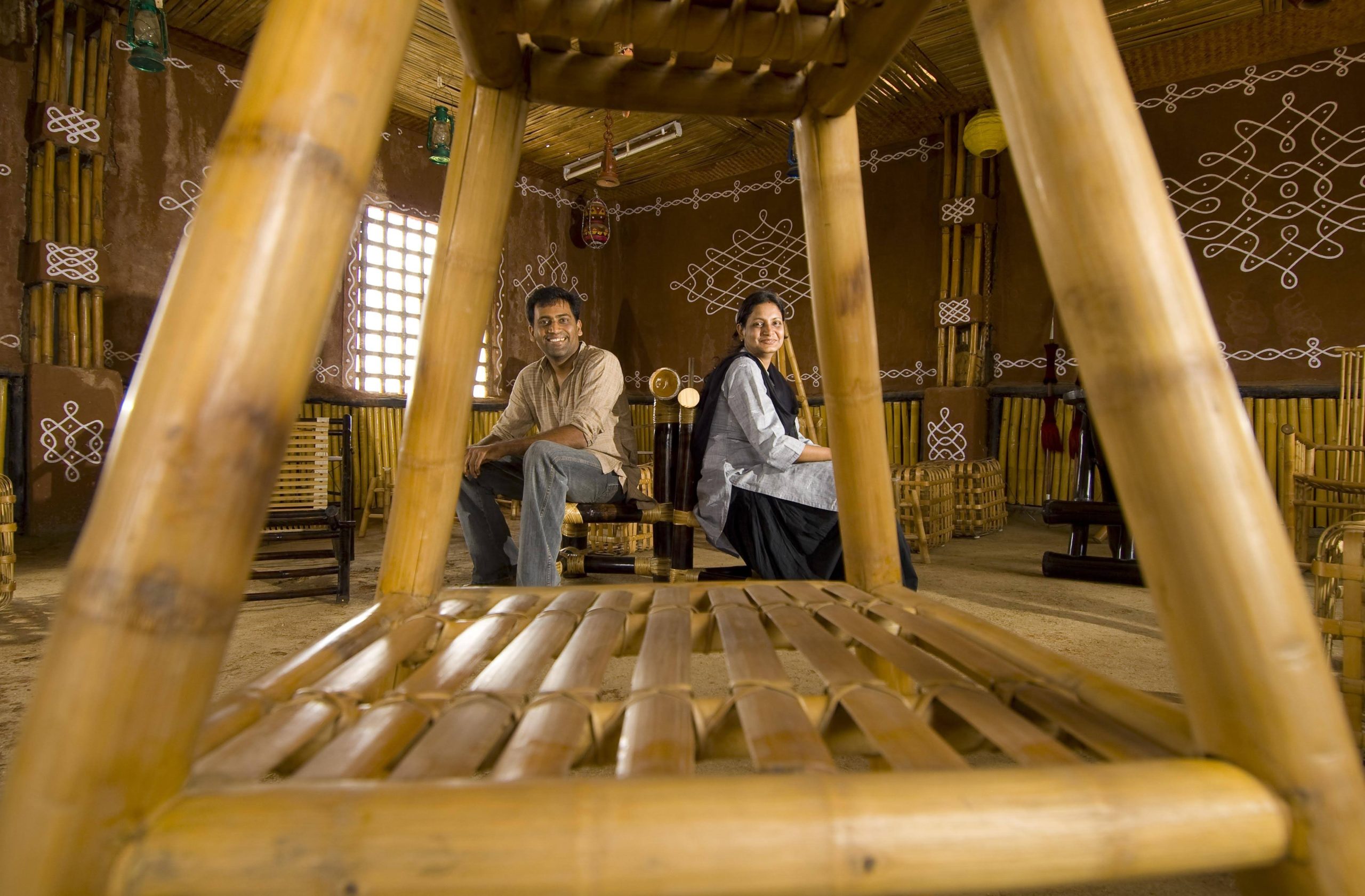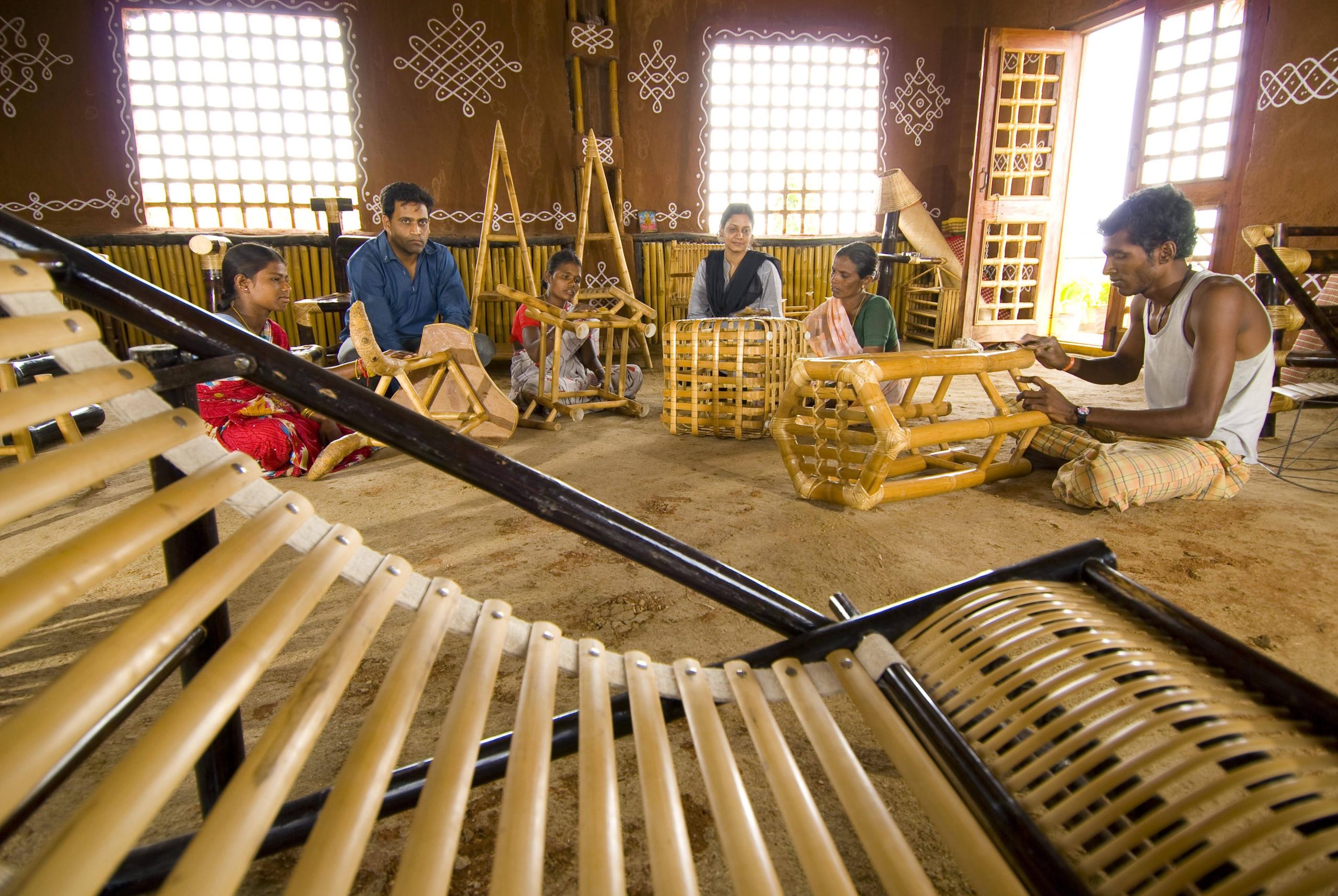(January 16, 2023) In the year 2006, three months into their marriage, the quest to buy an eco-friendly sofa set for their home took Prashant and Aruna Lingam to a small village called “Katlamara” on the India-Bangladesh border.
Enamoured by bamboo and the amazing skills of the local bamboo communities, they decided on social entrepreneurship themselves. It was an unknown domain then but they took the risk, launching Bamboo House India in 2007.

Prashant and Aruna Lingam, co-founders, Bamboo House India
A risky leap to social entrepreneurship
It was a tough call for a middle-class, just married couple to get into the bamboo business and their families were much against it. Yet, they went ahead. The decision proved costly for them during the next three years, forcing them into a debt of Rs. 60 lakh (approximately $ 80,000) owing to a failed business model.
Despite being plagued with physical, mental, financial, and personal woes, their passion for bamboo refused to die. “Today, Bamboo House India is the largest builder of bamboo and recycled plastic houses in the country with a robust social business model which never existed in India earlier,” smile Prashant and Aruna, speaking exclusively to Global Indian.
The successful revival of their enterprise from the brink of a complete washout provided them with an opportunity to bring a bamboo revolution to India.
Challenges galore
“Years of failures coupled with knowledge gained from tribal communities, waste pickers, farmers, municipal bodies, and multi-lateral agencies taught us to comprehend the ground realities and think out-of-the-box,” say the founders of Bamboo House India, who have received many awards for their work.
While Prashant is a management graduate, Aruna is a science graduate. Their initial days of entrepreneurship were tough. “My post-pregnancy complications, my husband’s year-long immobility caused by a near-fatal accident, the deaths of six loved ones, lack of household income, and my inability to put proper food on the table for two years only aggravated the situation took a toll on my mental health,” informs Aruna. In those trying times, Aruna had to offer up whatever little jewellery she had left, to rework their business model and give their bamboo enterprise another try.

When fortune favoured them
It was only after a Hyderabad-based client reached out to them for a bamboo project that fortune for this couple turned its course. “But the client’s lack of trust about the durability of the product became a stumbling block. I convinced him to pay us post production and only if the end-result is up to his satisfaction,” recalls Prashant.
The end product not only turned out to be extremely well-constructed but also earned a good reputation for the bamboo houses in the region. The success led them to build recreational bamboo houses at the behest of prime corporate houses like Google and Infosys.
For Prashant and Aruna, their difficult entrepreneurial journey introduced them to certain qualities and abilities which they never knew existed. “I never knew I had so much determination, patience, and ability to take extreme risks and fight so many odds,” says Aruna, while Prashant nods in complete agreement.
Recognition for the ‘bamboo couple of India’
Known as the “bamboo couple of India” Prashant and Aruna networked effectively and brought in stakeholders like the Confederation of Indian Industries, the Indian Institute of Technology, the National Mission on Bamboo Applications, and Andhra Pradesh Forest Department, forging a multi-stakeholder partnership which triggered the construction of 300+ eco houses till date.
Their work received greater recognition from the US State Department not only when they nominated Aruna for the prestigious International Visitor Leadership Program for global thought leaders but also when they made a short video feature on their innovative work for Global Entrepreneurship summit 2017 (Hyderabad), an event graced by Prime Minister Narendra Modi and the then US President Donald Trump’s daughter Ivanka Trump.
Recognition for their work continued when they received an invitation from the Government of Kenya to replicate their social business models in their country and case studies by the Indian School of Business, ICFAI University, University of Mexico, and IDEX. “It further strengthened our belief in the work we were doing,” smile the couple, who also constructed 100 low-cost shelters using plastic waste and received global attention after coverage by BBC and the World Economic Forum.
A creative business model
“We designed a lean, sustainable, and innovative business model which laid a road map for our personal and professional growth,” says Aruna, who believes that their business is commercially profitable and socially impactful because of the innovative products designed to meet customer needs without compromising on the social deliverables.
When they were struggling to get a foothold in the market, the lack of funds nudged them to rope in the media as an important stakeholder in their vision to achieve social progress. What started with a single local newspaper coverage in 2006 has today snowballed to media features in over 1500 national and international media platforms including Entrepreneur, BBC, Brut, CII, CNN, World Economic Forum, French TV, Australian TV, to name a few.
Lifetime learners
Aruna believes that theoretical knowledge is an important foundation for an entrepreneur’s toolkit, which they could not obtain during their initial days of entrepreneurial journey.
“All our decisions were based on intuition and gut-feel, rather than organized subject knowledge, and today I have decided to go back to school and obtain the required learning to scale my impact,” says Aruna, who is all set to broaden her horizon by pursuing her masters in innovation and entrepreneurship from London School of Economics. Their innovative social business models have been globally studied with universities Harvard, Cornell, Kellogg and ISB doing case studies on their work.
Last year, www.reall.net, a UK-based social housing company offered to bring in investment in their work and this year too they proposed a green entrepreneurship project from IKEA Foundation.
“My innovations in plastic waste shelter solutions found a platform under the UNDP program for possible global replication. Still, I am afraid to take up projects of this magnitude due to lack of organized subject knowledge, lack of business model clarity. That’s why I want to go back to school and capitalise on my experiences,” explains Aruna, a renowned speaker on national and international platforms on various topics including circular economy, waste management and social entrepreneurship.
Aruna has also been named among the world’s 100 social entrepreneurs bringing a change with her work and her bamboo work has been featured in World Bank Report as well.
Creating employment
Motivating people to pursue their dreams and having successfully created employment opportunities for thousands of artisans and waste pickers, she has mentored and influenced students, academicians, children, housewives, corporates, NGOs, and society at large with her work.
Experimenting with new material has been central to their success. Once, the entrepreneur-couple even used discarded tyres and came up with a range of fabulously comfortable furniture by taking unwanted lorry and car tyres and turning them into quirky seating options with creative flair and endless innovation.
“Once, we saw tyres being burnt and the owner told us there was no process in place to discard them. We decided to help with the problem,” says Prashant.
Constant experimentation
View this post on Instagram
The founders of Bamboo House India have also experimented with trash plastic bottles to build sustainable homes, replacing bricks. “Housing shortfall in India stands today at 148 lakh dwelling units and we hope our innovative techniques will help bring it down,” say the Lingam couple, who are on a mission to improve the housing situation of the poor in the country. For those who do not know, a mud-filled plastic bottle is no less strong than a brick.
A plastic bottle house costs a quarter of the money required to build a conventional house, points out Prashant. The 225 sq ft house looks like an ordinary home, but it differs in many ways. “The structure has the added advantage of being fire proof and earthquake resistant,” says the TEDx speaker. In terms of strength, performance is equal to bricks and may be better too.
Prashant feels the in the mantra “reduce, reuse and recycle”, the ‘reuse’ part is often overlooked. In one pilot project, they built a house with bamboo and bottles.
How it works
Explaining how they went about it, Prashant says while the basic skeleton was made with bamboo, bottles filled with mud were placed both vertically and horizontally for walls, which offers thermal insulation. “The plastering was done with mud and cow dung and Cement plaster was used only for the final coat. The roof was made with bamboo attached to wooden batons,” he explains.
Over the years, the couple constructed 55 street vending kiosks using plastic waste, laid10,000 sq. ft of recycled plastic paver tiles, installed 5,000 recycled plastic street dust bins, enabling then to circulate 10,000 MT of plastic waste from landfills and water bodies.
“Continuing with our eco spirit, we developed low-cost shelters using agricultural waste to address the issue of stubble burning and to date, have constructed 25 Agri waste houses circulating close to 5,000 tons of agricultural waste,” inform the Lingams, who employ thousands of artisans from villages including women on a part-time basis ensuring their livelihood and a better standard of living.
- Follow Bamboo House India on Instagram and YouTube
